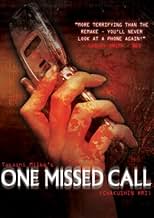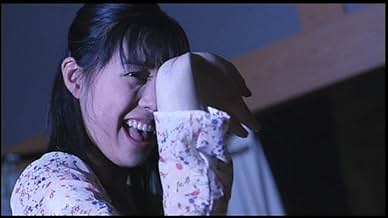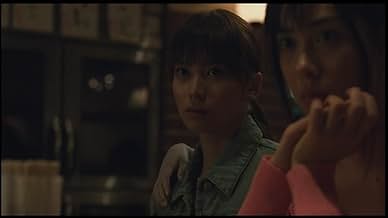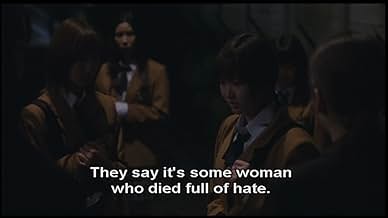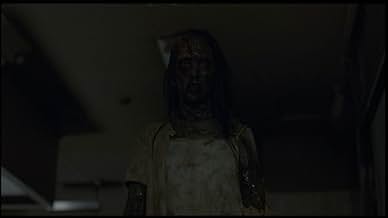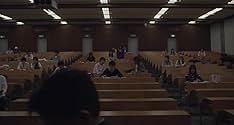IMDb-BEWERTUNG
6,2/10
19.793
IHRE BEWERTUNG
Menschen beginnen auf mysteriöse Weise, Voicemail-Nachrichten von ihrem zukünftigen Selbst zu erhalten, die ihren Tod vorhersagen.Menschen beginnen auf mysteriöse Weise, Voicemail-Nachrichten von ihrem zukünftigen Selbst zu erhalten, die ihren Tod vorhersagen.Menschen beginnen auf mysteriöse Weise, Voicemail-Nachrichten von ihrem zukünftigen Selbst zu erhalten, die ihren Tod vorhersagen.
Handlung
WUSSTEST DU SCHON:
- WissenswertesDuring the opening credit sequence, one of the cell phone ring-tones is the theme song from an earlier Takashi Miike film, Gozu (2003).
- PatzerYumi arrives at the abandoned hospital at 6:45 p.m. on April 24, and it's nighttime. On that date, sunset in Japan ranges from around 6:20 p.m. Japan Standard Time in the east, near Tokyo, to around 6:55 p.m. in the west, near Nagasaki. Depending on what part of Japan she is in, it should be daytime or twilight outside, not full dark.
- Zitate
Yoko Okazaki: Oh no, it's raining.
- VerbindungenFeatured in Chakushin ari meikingu: Chakushin rireki (2003)
- SoundtracksIkutsuka no Sora
(Few Skies)
Vocal by Kô Shibasaki (as Kou Shibasaki)
Written by Yasushi Akimoto
Composed by Jin Nakamura
Arranged by Chokkaku
Universal J / Chimera Energy
Ausgewählte Rezension
It is hard to do something new in the world of horror these days. Even Japanese horrors which were deemed fresh in the late 90's got more and more repetitive, and we can say that after Kairo, there is nothing really fresh coming out of the horror department of Japanese films. The quiet atmosphere and the fear towards darkness within colorless world possessed by vicious female ghosts is no longer new to both Japan and the rest of the world. Ju-ons (all of them except the part 2 of the one made only for video which sucked badly) are scary; the series break the silent rule of Japanese horrors, its director even say that he tried to go the opposite way Nakata and Kurosawa went, he will scare the audience by showing the ghosts and gore as much as possible. And Ju-ons worked, to some extent; the director is successful in creating the world of nightmare that co-exist with the ordinary world that people live in. He use a normal house/apartment as his stage of fear and bring out all the every possible scare out of every corner of that place. But one can also say that Ju-ons are good only in parts; its strength is just the sum of a few very scary scenes that the director successfully created and not the overall atmosphere or the story of the films. Now it's time for the ever creative Miike who once scared the hell out of the audience, not by using ghosts, but using a sadistic but innocent-looking girl, to put some new blood into Japanese horrors. As a big fan of J-horror and Miike, I was so looking forward to the film and that I was afraid my high expectation will kill it, but the result was beyond my expectation, I enjoyed this thrill ride so much I wish it would never end.
In terms of story, Chakushin Ari is nothing new. It's the Ring plus mobile phone plus Miike trademark's world of weirdness. However, it's execution is a very good blend of Nakata's the silent and dark world and Simizu's bang bang ghost is coming style, and the result, IMHO, is very fresh and satisfying. Miike has toned down his weird and over-the-top scenes to suit the taste of wider audiences, but this film is still full of creative and scary scenes (the scene at the TV station which I deem so good it's classic, and the scene at the hospital which is so weird and spooky that I wish it could last longer) with quite satisfying story and (many may argue) acceptable open ending. Although his ingredients are nonetheless recycle of old tricks (everything from dark corners, female ghosts, old apartments, old hospitals, scary-as-hell sound effects, and right out of the screen gore and ghosts), they are orchestrated in such a stylish and enjoyable way that I can't help jumping and flinching while at the same time enjoying the ever rushing adrenalin in my vein. Repetitive, may be, but fresh ideas are still everywhere; Miike stood very good balance between Nakata's atmospheric scare/strong story and Shimizu illogically outrageous and bizarre world. In sum, a very very entertaining grade A pure horror (not psychological thriller in disguise) which is both repetitive and fresh at the same time. This film should satisfied both hardcore horror fans and those who want satisfying entertainment.
In terms of story, Chakushin Ari is nothing new. It's the Ring plus mobile phone plus Miike trademark's world of weirdness. However, it's execution is a very good blend of Nakata's the silent and dark world and Simizu's bang bang ghost is coming style, and the result, IMHO, is very fresh and satisfying. Miike has toned down his weird and over-the-top scenes to suit the taste of wider audiences, but this film is still full of creative and scary scenes (the scene at the TV station which I deem so good it's classic, and the scene at the hospital which is so weird and spooky that I wish it could last longer) with quite satisfying story and (many may argue) acceptable open ending. Although his ingredients are nonetheless recycle of old tricks (everything from dark corners, female ghosts, old apartments, old hospitals, scary-as-hell sound effects, and right out of the screen gore and ghosts), they are orchestrated in such a stylish and enjoyable way that I can't help jumping and flinching while at the same time enjoying the ever rushing adrenalin in my vein. Repetitive, may be, but fresh ideas are still everywhere; Miike stood very good balance between Nakata's atmospheric scare/strong story and Shimizu illogically outrageous and bizarre world. In sum, a very very entertaining grade A pure horror (not psychological thriller in disguise) which is both repetitive and fresh at the same time. This film should satisfied both hardcore horror fans and those who want satisfying entertainment.
Top-Auswahl
Melde dich zum Bewerten an und greife auf die Watchlist für personalisierte Empfehlungen zu.
- How long is One Missed Call?Powered by Alexa
Details
Box Office
- Weltweiter Bruttoertrag
- 17.605.379 $
- Laufzeit1 Stunde 52 Minuten
- Farbe
- Sound-Mix
- Seitenverhältnis
- 1.85 : 1
Zu dieser Seite beitragen
Bearbeitung vorschlagen oder fehlenden Inhalt hinzufügen



